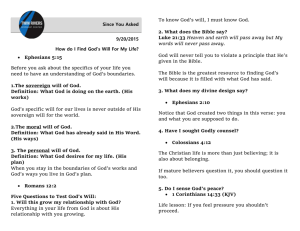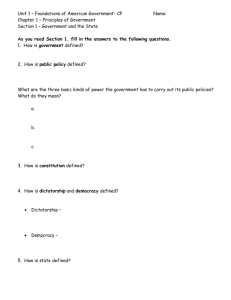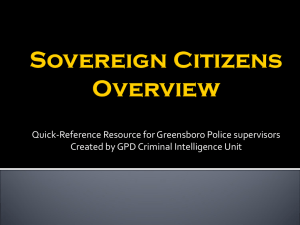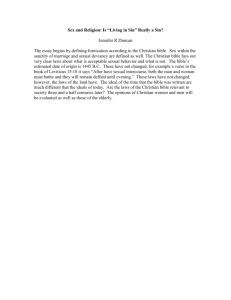to view the PowerPoint presentation.
advertisement
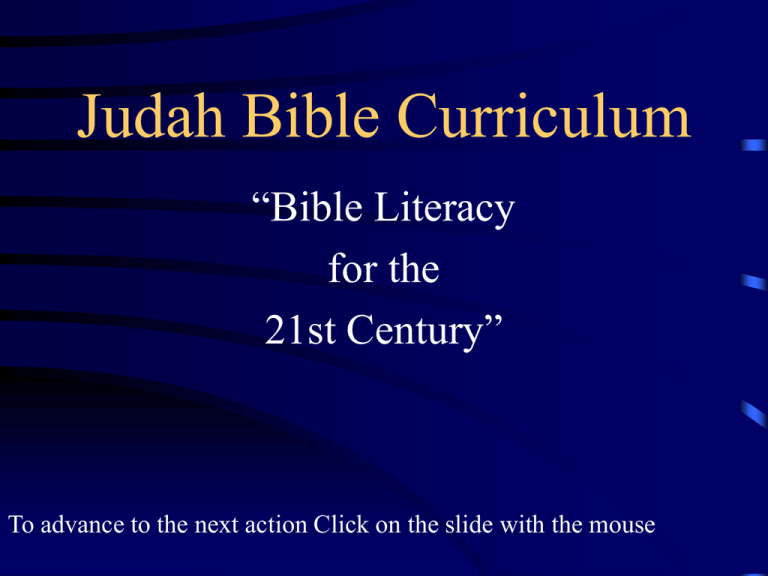
Judah Bible Curriculum “Bible Literacy for the 21st Century” To advance to the next action Click on the slide with the mouse Philosophy of Education • When choosing a curriculum, we are primarily interested in the content of the curriculum and its methods: "What will I teach and how will I teach it?" • The content and methods of a curriculum are defined by its philosophy of education, “Why am I teaching it this way?” • All education produces Character in the student.(for more info on this topic please see philosophy) • Our philosophy of education is defined by our philosophy of government. There are Three Philosophies of Government Individual is Sovereign God is Sovereign State is Sovereign No Government Internal Government External Government Anarchy Liberty with Law Tyranny Philosophy of Education where the “Individual is Sovereign” • Secular Education in America (some some Christian Education) • Individual trained to be autonomous, self-actualized – Individual character - ungoverned by anything but self – Individual is Peer Sensitive • Fears peers and is self centered – No basis in truth (relativism), reasoning ability not taught • No basis in truth from which to reason, only opinion – Does not recognize any authority higher than self • Leads to hedonism, rebellion, anarchy politically – Individual ungoverned therefore dependent on others to govern him – Can be manipulated due to ignorance Philosophy of Education where the “State (or structure) is Sovereign” • Private Education in America (some Christian Education) • Individual trained to be authority sensitive – Individual character - externally governed by fear • Fears authorities – Rote education methods, memory, recitation, Bible details – reasoning not taught - learn what is given by authorities • “Bible says it, you believe it, that settles it.” – Individual dependent - feels an emotional need to have authorities to govern him • Slavish character, leads to cults, socialism politically – Can be manipulated due to a follow-the-leader mentality Philosophy of Education where “God is Sovereign” • Biblical Christian Education • Individual trained to be sensitive to God’s kingdom – – – – – Individual character - internally governed by Jesus God sensitive, fears God Education includes basis in Truth, Bible understanding Reasoning ability taught to apply Truth to all of life Individual character non-dependent and Godly • Able to govern self under God regardless of peers or authorities • Leads to liberty without chaos, and strength – Individual knows how to do what is right on his own – Cannot be manipulated - knows from the Bible why he is doing what he is doing Methodology where the “Individual is Sovereign” • American secular education (some Christian Education) – Draw out the child (autonomy) • “How do you feel about…” • “Kids, what do you want to do today?” • Implant facts sensorially – Child is a sensory being • Emphasis emotions, senses, feelings • Experience everything, then you are educated – Workbook approach, psychological tests, stimulus/response exercises – Little or no homework – This education is child intensive. Methodology where the “State (or Structure) is Sovereign” • Private Education in America (some Christian Education) – Pour in the facts • Memory, recitation, packaged curricula – Child is an intellectual being • emphasis mind - know facts and details • know lots of things and then you are educated – Textbook approach, standardized tests, fill in the blank, matching – Lots of homework - keep ‘em busy – This education is material intensive Methodology where “God is Sovereign” • Biblical Christian Education – Both pour in then draw out thoughts and conclusions • Facts and memory plus reasoning from the facts – Child is a governing being • Emphasis making right choices and understanding “Why” • Make right choices and then you are educated – Notebook approach, essay tests, writing exercises, research, reasoning out Biblical principles – Homework as necessary to master the subject – This education is teacher intensive. Character and Government “Individual is Sovereign” • • • • Character ungoverned, therefore dependent Peer sensitive - fears pears Autonomous character Obeys self - feels hypocritical choosing against emotions/feelings • Child is King • Government - Anarchy • No law - freedom but chaos Character and Government “State (or Structure) is Sovereign” • • • • Externally governed, i.e. dependent Authority sensitive - fears authorities Slave character Obeys authority blindly - feels guilty choosing against authorities • State (or Church) is king • Government - Tyranny • External law - order but slavery Character and Government “God is Sovereign” • • • • Internally governed - non-dependent God sensitive - fears God Self-governing character under God Obeys God - confident choosing right against emotions or authorities • God is King • Government - Liberty with Law • Law written on the heart - both order and freedom Judahbible.com homepage More discussion on philosophy of education

